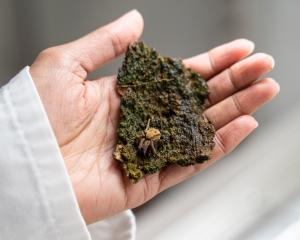The environmental advocate is stepping down from her part-time role at the Avon-Heathcote Estuary Ihutai Trust after more than 25 years.
"I've loved working for the estuary trust but it's just time for someone with new ideas, and better IT skills than me to take over."
In 2002, she helped set up the trust to advocate for the estuary's ecology. She was its environmental educator.
"I've always worked part-time so that I can volunteer the rest of my time and do what I want to do."
The 65-year-old said the change will give her more time to pursue other challenges and volunteering projects.
Jenkins' great passion is the estuary.
"It's the most amazing place for me. The fact that we have a wetland of international significance in the middle of a city makes it unique."
The Woolston resident organises a range of events and campaigns aimed at protecting the estuary and raising awareness of its value.

It serves as an internationally significant stopover point for migratory birds and is a habitat for native species, including godwits and oystercatchers.
Jenkins and other volunteers have set up eight wetland restoration projects around the estuary.
"We're there every Sunday afternoon weeding and doing whatever we can."
Jenkins was 19 when she arrived in New Zealand in 1980 from the Netherlands.
"I came for a holiday but I just never returned. I thought this is paradise with mountains, oceans and wetlands, and all these beautiful creatures. Why would you not want to be here?"
She said her family was gutted when she made the difficult phone call to tell them she wasn't coming back.
"My mother started crying and hung up on me."
She said they have made up since then. She went on to have her own family.
She said she immediately joined environmental groups which were enhancing wetlands.
"I used to pick up litter in the streets and people would ask me what I was doing. They thought I was looking for cigarette butts but I said no, whatever goes down the drains ends up in the wetlands and estuary."
She said her conservation work was a way to give back to New Zealand.
It was when her two children went to primary school that she realised they were not being taught environmental conservation.
"I thought if no one is teaching them how to protect the environment then we're going to ruin it pretty quickly."
That spurred her into action.
"I did a lot of research and, in 1992, I set up the first environmental education consultancy business in New Zealand."
She voluntarily introduced environmental lessons in schools.
"It's now in the curriculum. Education in schools has made a humongous difference."
Jenkins founded Seaweek in 1992, an annual celebration in March of marine life and waterways.
"It started in Australia. Someone there heard about me and rang up asking if I could introduce it to New Zealand. I said sure. They said well that makes you from today the national co-ordinator."
The week-long event in March features beach and waterway clean-ups and educational activities.
"It was all voluntary work but quickly got bigger than Ben-Hur, so I had to pass it on to another national co-ordinator."
She said a key event was the annual Mother of All Clean Ups, held in April.
Jenkins helped organise more than 1000 volunteers who collected 600 bags of rubbish from Christchurch's waterways earlier this year over a single weekend.
Among the several tonnes of rubbish collected were discarded TVs, microwaves, and cushions.
She said it was disappointing to see so little improvement in the waterways after a decade of running the event.
"We were always hoping when we started that we may make ourselves obsolete. That was a bit too optimistic. There will always be people who litter, and we still have a lot to educate."

"I saw an item about farmers risking fines to shoot seals in Kaikoura for dog tucker."
That angered her, and she quickly mobilised a group of volunteers from Christchurch and Kaikoura to patrol the coastline and protect the seals.
"We got the Department of Conservation involved, and Marine Watch grew to include injured wildlife and whale strandings."
The organisation was taken over by DOC and Project Jonah.
"I like to get an idea in motion, so that other people can take over and I can do another project."
Jenkins also founded the Farewell to the Godwits event, which attracts hundreds of people to the estuary every March.
"It's another way of educating the public in a fun way about the importance of the estuary."
For more than 25 years she has watched the birds take off on their non-stop marathon flight to their breeding grounds in Alaska.
"It is the longest bird migration in the world. That makes them so special.”
Jenkins said funding is getting harder and harder for environmental groups and she wants to help them.
"We're loosing momentum, and that's really scary."
They need to look at other ways of getting volunteers and funding, she said. This includes plans to become more involved in Rotary International.
"They've just signed up with the United Nations. One of their core functions is to improve the water quality of waterways around the world. I thought we want a slice of that funding here in New Zealand.
"I'm not finished yet."














